Specialist 1 Le Vo Minh Tri, Department of Dentistry, Nam Sai Gon International General Hospital , explains that every time you brush your teeth, the toothbrush comes into direct contact with bacteria in the oral cavity, leftover food, and even blood (if you have gingivitis). Therefore, used toothbrush heads can contain millions of bacteria, including many types that cause oral diseases such as Streptococcus mutans, Lactobacillus - the culprits that cause tooth decay, gingivitis, and bad breath.
Toothbrushes should be replaced every 2-3 months, or sooner if the bristles are frayed, bent, or hardened. This will significantly reduce the effectiveness of cleaning plaque and food debris from teeth; at the same time, it will create conditions for bacteria to accumulate and grow silently.
If you continue to use the same toothbrush, the amount of bacteria will return to the oral cavity, increasing the risk of infection. Especially in people with weak immune systems (elderly people, people with chronic diseases, people after surgery or young children), the risk of complications is higher, which can lead to gum infection, tooth abscess, periodontitis, and even spread to pharyngitis. or upper respiratory tract infections, affecting health and quality of life.
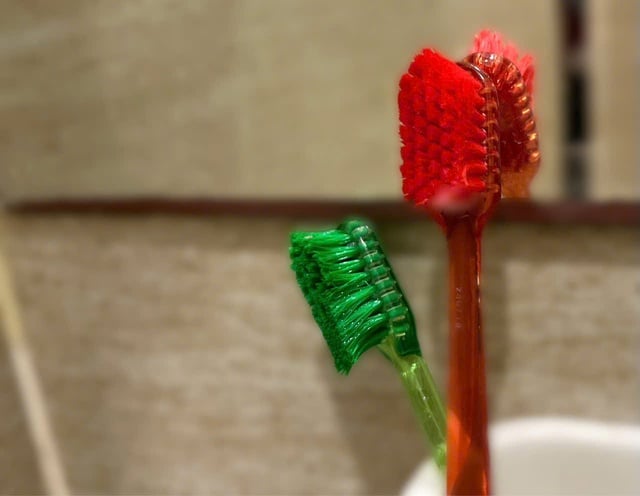
Toothbrushes should be replaced every 2-3 months, especially when the bristles become worn, stiff or bent.
PHOTO: AC
What should users pay attention to in daily toothbrush storage?
In addition to regular replacement, Dr. Tri also recommends that users pay attention to how to preserve their toothbrushes to minimize the growth of bacteria:
- Rinse the toothbrush thoroughly after each use under running water to remove toothpaste and plaque.
- Shake off the water and stand the brush upright, keep in a ventilated place, avoid humid environment.
- Do not close the cap tightly when the toothbrush is still wet, as moisture will create conditions for bacteria and mold to grow.
- Avoid placing your toothbrush near the toilet, as bacteria from splashing water can cling to the bristles. It is best to keep it in a separate cabinet with ventilation holes.
- Do not share toothbrushes and do not let the toothbrush heads touch each other.
- After recovering from an illness (flu, sore throat, mouth ulcers, etc.), you should replace your toothbrush immediately to avoid re-infection.
- If you travel frequently, use a dedicated toothbrush holder with ventilation holes.
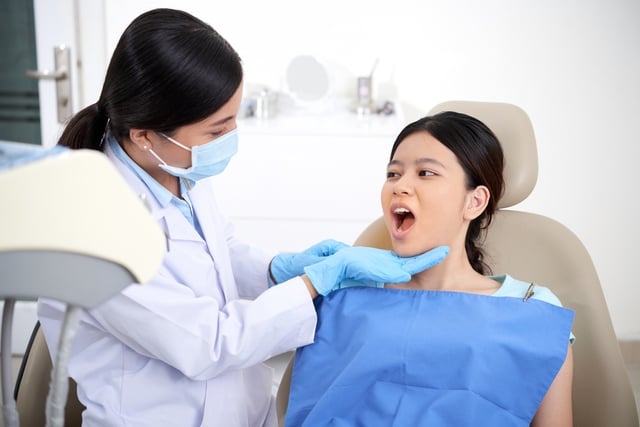
Children with signs of gum infection, tooth abscess, periodontitis need to see a specialist soon.
PHOTO: TH
How to choose the right toothbrush
For adults, you should choose a toothbrush with a small head that fits the mouth, soft bristles - or medium hardness to clean plaque without damaging the gums. For children, you need a toothbrush with a small head, very soft bristles, a handle that fits in the hand and is easy to operate; for children under 6 years old, an adult should assist in the oral hygiene process.
People with braces should use a toothbrush specifically designed for braces, combined with an interdental brush or water flosser for optimal oral hygiene. People with gum disease or receding gums should use a super soft bristle toothbrush with a round brush head to avoid further damage.
Toothbrushes are the items that come into direct contact with the oral cavity every day. Therefore, regular replacement and proper storage are important in preventing infection. Do not continue to use worn or damaged toothbrushes, because bacteria may have accumulated a lot before. Choose the right toothbrush, brush your teeth at least 2 times/day, combined with dental floss and regular dental check-ups every 6 months will help protect your oral health best.

Source: https://thanhnien.vn/alo-bac-si-nghe-khong-thay-ban-chai-danh-rang-thuong-xuyen-hai-suc-khoe-the-nao-185251006002840862.htm


![[Photo] Prime Minister Pham Minh Chinh chaired a meeting of the Steering Committee on the arrangement of public service units under ministries, branches and localities.](https://vphoto.vietnam.vn/thumb/1200x675/vietnam/resource/IMAGE/2025/10/06/1759767137532_dsc-8743-jpg.webp)
![[Photo] Prime Minister Pham Minh Chinh chairs a meeting of the Government Standing Committee to remove obstacles for projects.](https://vphoto.vietnam.vn/thumb/1200x675/vietnam/resource/IMAGE/2025/10/06/1759768638313_dsc-9023-jpg.webp)





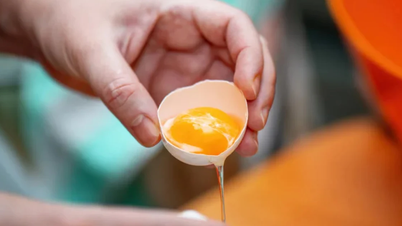























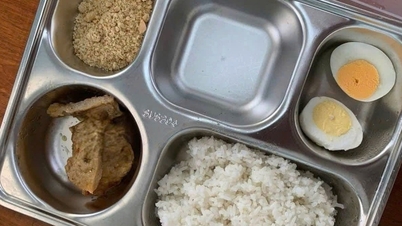


















































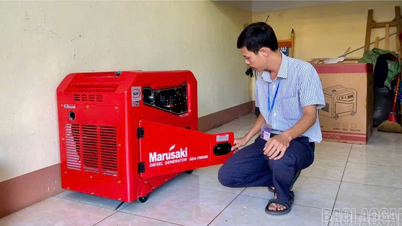


















Comment (0)